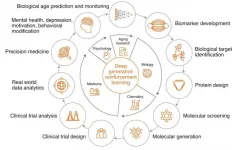(Press-News.org) MIT researchers have developed a type of neural network that learns on the job, not just during its training phase. These flexible algorithms, dubbed "liquid" networks, change their underlying equations to continuously adapt to new data inputs. The advance could aid decision making based on data streams that change over time, including those involved in medical diagnosis and autonomous driving.
"This is a way forward for the future of robot control, natural language processing, video processing -- any form of time series data processing," says Ramin Hasani, the study's lead author. "The potential is really significant."
The research will be presented at February's AAAI Conference on Artificial Intelligence. In addition to Hasani, a postdoc in the MIT Computer Science and Artificial Intelligence Laboratory (CSAIL), MIT co-authors include Daniela Rus, CSAIL director and the Andrew and Erna Viterbi Professor of Electrical Engineering and Computer Science, and PhD student Alexander Amini. Other co-authors include Mathias Lechner of the Institute of Science and Technology Austria and Radu Grosu of the Vienna University of Technology.
Time series data are both ubiquitous and vital to our understanding the world, according to Hasani. "The real world is all about sequences. Even our perception -- you're not perceiving images, you're perceiving sequences of images," he says. "So, time series data actually create our reality."
He points to video processing, financial data, and medical diagnostic applications as examples of time series that are central to society. The vicissitudes of these ever-changing data streams can be unpredictable. Yet analyzing these data in real time, and using them to anticipate future behavior, can boost the development of emerging technologies like self-driving cars. So Hasani built an algorithm fit for the task.
Hasani designed a neural network that can adapt to the variability of real-world systems. Neural networks are algorithms that recognize patterns by analyzing a set of "training" examples. They're often said to mimic the processing pathways of the brain -- Hasani drew inspiration directly from the microscopic nematode, C. elegans. "It only has 302 neurons in its nervous system," he says, "yet it can generate unexpectedly complex dynamics."
Hasani coded his neural network with careful attention to how C. elegans neurons activate and communicate with each other via electrical impulses. In the equations he used to structure his neural network, he allowed the parameters to change over time based on the results of a nested set of differential equations.
This flexibility is key. Most neural networks' behavior is fixed after the training phase, which means they're bad at adjusting to changes in the incoming data stream. Hasani says the fluidity of his "liquid" network makes it more resilient to unexpected or noisy data, like if heavy rain obscures the view of a camera on a self-driving car. "So, it's more robust," he says.
There's another advantage of the network's flexibility, he adds: "It's more interpretable."
Hasani says his liquid network skirts the inscrutability common to other neural networks. "Just changing the representation of a neuron," which Hasani did with the differential equations, "you can really explore some degrees of complexity you couldn't explore otherwise." Thanks to Hasani's small number of highly expressive neurons, it's easier to peer into the "black box" of the network's decision making and diagnose why the network made a certain characterization.
"The model itself is richer in terms of expressivity," says Hasani. That could help engineers understand and improve the liquid network's performance.
Hasani's network excelled in a battery of tests. It edged out other state-of-the-art time series algorithms by a few percentage points in accurately predicting future values in datasets, ranging from atmospheric chemistry to traffic patterns. "In many applications, we see the performance is reliably high," he says. Plus, the network's small size meant it completed the tests without a steep computing cost. "Everyone talks about scaling up their network," says Hasani. "We want to scale down, to have fewer but richer nodes."
Hasani plans to keep improving the system and ready it for industrial application. "We have a provably more expressive neural network that is inspired by nature. But this is just the beginning of the process," he says. "The obvious question is how do you extend this? We think this kind of network could be a key element of future intelligence systems."
INFORMATION:
This research was funded, in part, by Boeing, the National Science Foundation, the Austrian Science Fund, and Electronic Components and Systems for European Leadership.
Written by Daniel Ackerman, MIT News Office
Additional background
Paper: "Liquid Time-constant networks"
https://arxiv.org/pdf/2006.04439.pdf
Philadelphia, January 28, 2021 - A collaborative study from the Center for Injury Research and Prevention (CIRP) and the Center for Autism Research (CAR) at Children's Hospital of Philadelphia (CHOP) found that compared with their non-autistic peers, young autistic drivers have lower rates of moving violations and license suspensions, as well as similar to lower crash rates.
The findings were recently published online by the Journal of the American Academy of Child and Adolescent Psychiatry.
Obtaining a driver's license is an important milestone for adolescents and young adults. One-third of autistic individuals without intellectual disability obtain ...
WEST LAFAYETTE, Ind. - An improved extraction method involving chia seeds may provide new options for nutritional foods, medicine capsules and anti-aging products.
A Purdue University team has developed and patented the method to separate mucilage from chia seeds, yielding a protein-rich chia seed flour with improved bioactivity and functionality compared with conventional methods.
This work was supported by the USDA National Institute of Food and Agriculture, Hatch Act formula funds project 1019794.
Mucilage is a thick and gluey substance that surrounds chia seeds and can make processing the seeds for food or pharmaceutical uses much more difficult or nearly impossible.
"We are excited about our ...
King's College London researchers have found evidence that minocycline, a widely used antibiotic with anti-inflammatory properties, gave greater improvement in depressive symptoms in patients with treatment resistant depression with low-grade peripheral inflammation.
Improvement in depressive symptoms
In a four-week randomised clinical MINDEP (MINocycline in DEPression) trial, 39 patients with major depressive disorder were recruited from services linked to South London and Maudsley NHS Foundation Trust (SLaM) and via public advertisement.
The trial took place at the NIHR / Wellcome Trust King's Clinical Research Facility at King's College Hospital. The patients, who were taking their routine antidepressant treatment, were split into two ...
New research suggests that a higher dietary intake of long chain omega-3 fatty acids in childhood may reduce the risk of developing subsequent asthma, but only in children carrying a common gene variant. The study, led by Queen Mary University of London, is in collaboration with the University of Bristol and University of Southampton, UK, and Karolinska Institutet, Sweden.
In the UK, 1.1 million children (1 in 11) are currently receiving treatment for asthma and most adult asthma begins in childhood. The NHS spends around £1 billion a year treating and caring for people with asthma.
Senior author, Professor Seif Shaheen from Queen Mary ...
Helping people to self isolate after testing positive for covid-19 must now be a top priority for the UK government, argue experts in The BMJ today.
Dr Muge Cevik at the University of St Andrews and colleagues say the focus should be on those working in high exposure occupations, living in overcrowded housing, or without a home, and should include free and safe accommodation alongside adequate income support, job protection, and help with caring responsibilities.
Most countries have used testing as a tool to interrupt transmission chains by encouraging ...
Access to legal cannabis stores is associated with a reduction in opioid related deaths in the United States, particularly those linked to synthetic opioids such as fentanyl, finds a study published by The BMJ today.
Opioids are 'morphine-type' drugs that relieve short-term (acute) pain and pain at the end of life. There is little evidence that they are helpful for long-term (chronic) pain, but they are often prescribed for this reason.
This has led to widespread misuse and a sharp rise in overdose deaths, particularly in the United States. In 2018, there were more than 46,000 fentanyl related deaths, representing over two thirds of all US opioid related deaths that ...
A new study has shown that, while there is limited evidence for overall increased mortality in patients with atopic eczema, those with severe atopic eczema may have a greater risk of dying from several health issues compared with those without eczema, according to a new study in the Journal of Allergy and Clinical Immunology.
The research team, led by the London School of Hygiene & Tropical Medicine (LSHTM) and funded by the Wellcome Trust, compared the risk of dying in over 500,000 adults with atopic eczema with more than 2.5 million without eczema. Patients with severe atopic eczema had a 62% higher risk of dying compared to ...
27th of January, Wednesday, Hong Kong - Deep Longevity, a fully-owned subsidiary of Regent Pacific (HKEX: 0575), specializing in the development and the application of next-generation artificial intelligence (AI) for aging and longevity research, today announced the publication of an article in END ...
The thought of eating insects is stomach turning for many, but new Edith Cowan University (ECU) research is shedding light on allergy causing proteins which could pose serious health risks for those suffering from shellfish allergy.
The research, published in the journal Food Chemistry, identified 20 proteins found in cricket food products which could cause serious allergic reactions.
The project was led by Professor Michelle Colgrave from ECU's School of Science and the CSIRO.
Professor Colgrave said crickets and other insects could be the key to feeding ...
DALLAS (January 26, 2021) - Many people believe that they can't change their brains, or that their brain health will inevitably decline as they age. But the Strategic Memory Advanced Reasoning Tactics (SMART) training protocol, created by researchers and clinicians at the Center for BrainHealth®, has been demonstrated over the past two decades to improve cognitive function and psychological well-being in laboratory participants. Recent research suggests that SMART can even make long-lasting improvements to people's brain health when given outside of the lab in short, informal training sessions.
A paper detailing these findings was recently published in Military Medicine. The research was a collaboration between Leanne R. Young, PhD, of Applied Research Associates, ...


